In these 6 countries child marriage is still legal
Poverty and lack of education, aggravated by Covid-19, are the main reasons that force girls to leave their studies and get married.
Child marriage is a violation of the most fundamental human rights and affects girls in every aspect of their lives. In the next decade, 10 million girls are at risk of falling victim to child marriage due to Covid-19. Disruption of education, economic shock, cessation of basic programmes and services, pregnancy and the death of a parent were the five factors that negatively impacted child marriages.
Child marriage, often forced, is associated with adverse events that are suffered primarily by women. These include forced pregnancies, abortions or female sterilization. Women who marry as children have a lower level of education and are more inclined to accept patriarchal gender roles.
Child marriage is defined as any formal marriage or informal union between a child under the age of 18 and an adult or other minor. The highest rate of child marriage is found in less developed countries, with 36% of marriages being for girls. Although there is a higher prevalence in these countries, it is estimated that in almost all nations of the world a child under the age of 18 marries an adult or another minor.
Although the third goal of SDG 5 (Gender Equality) includes “eliminating all harmful practices, such as child, early and forced marriage and female genital mutilation”, none of the regions mentioned is on the path to completely eliminating this practice by 2030. Not even in Western Europe and Central Asia, where 94% of countries had made child marriage illegal.
More poverty, less education
According to the report Covid-19 and child marriage: How COVID-19’s impact on hunger and education is forcing children into marriage by World Vision, hunger, access to education and parental support are the three areas affected by the pandemic. In addition, it has been shown that children who are not in school are 3.4 times more likely to end up getting married compared to those who do attend school.
Covid-19 has negatively affected efforts to overcome forced child marriages, causing dire economic consequences. According to several studies, in some countries affected by disasters, the poorest families decide to marry their underage daughters and sons in order to have another source of income or to reduce the economic burden on the household. Girls who marry not only lose their childhood, they often also cut ties with family and friends and take on a domestic role.
School closures left billions of students unable to receive an education, affecting their daily lives and academic progress. Many girls have given up on school altogether, and many more are likely to stay away when schools reopen. Girls who marry not only lose their childhood, they often also cut ties with family and friends and take on a domestic role, as they are prohibited from seeking a job or continuing to attend school.
Six countries, six faces
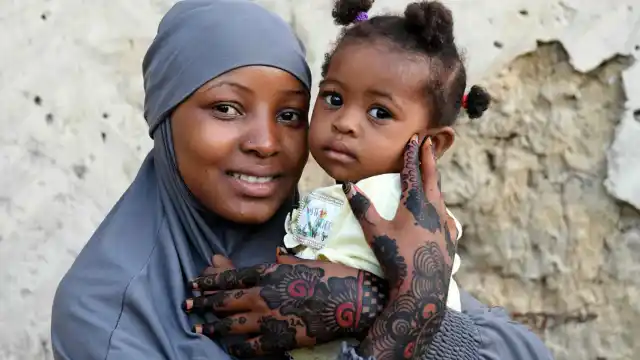
1. Barira (Níger)
Barira Mamoudou is an 18-year-old girl from Diffa, a town in the south-east of Niger. She was able to marry for love, after having been the victim of a forced marriage. “I was 14 years old and I was in class when one day, after class, my father told me that he had found a man who wanted to marry me.”
“I was scared and started to cry. I remember it very well. But my father told me that if I didn’t get married I would abandon my mother and sisters.” Barira was in a very vulnerable situation. Either she got married or her father would abandon his family. “I was a child and I didn’t know what to do, so I agreed.”
Her ex-husband, an older man, mistreated and abused her. “I was mistreated and abused by my husband, an older man, and I ran away. When I was lying on the street, crying, a woman helped me and accompanied me to the police station.” This is how she was able to get out of that situation.
Her ex-husband was eventually sentenced to prison and her father ended up abandoning her mother. When this happened, Barira was pregnant, but she didn't know it. Her daughter Jamilla was born and in 2021 she married a man she had met in her neighbourhood.
In Niger, 76% of young girls marry before the age of 18 and 28% before the age of 15. This Sahelian country has the highest prevalence rate of child marriage in the world. Under national legislation, in this African country, the minimum legal age of marriage is 15 for women and 18 for men. However, minors can marry with parental consent.
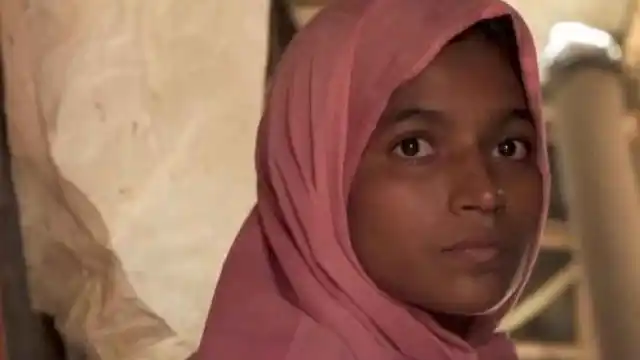
2. Sonjida (Bangladesh)
Sonjida, a young Rohingya woman from Hakimpara refugee camp in Bangladesh, was 15 years old when she got married. Her husband was 75 years old. “Before I got married, I didn’t think about marriage,” she explains. Poverty was the main reason that forced her to get married: “We were poor, so I had to marry this older man.”
Sojinda became pregnant. “I worry about what I will do when he dies. How will I take care of my baby?” In Rohingya refugee camps, the lack of educational and employment services leads many families to decide to marry off their daughters and sons.
However, generally, the Rohingya community views child marriage as inadvisable and associated with low status. In Bangladesh, 59% of girls are married before the age of 18 and 22% before the age of 15. It is the fourth country with the highest prevalence of child marriages among girls, and the second country in absolute terms with 4,382,000 child brides.
The minimum legal age for marriage is 18 for women and 21 for men. However, the Child Marriage Restraint Act of 2017 includes a loophole whereby a court can allow “in special cases” – for both boys and girls – child marriage.
There are concerns that this loophole allows female rape victims under 18 to marry their rapists to avoid the stigma and shame associated with the crime.
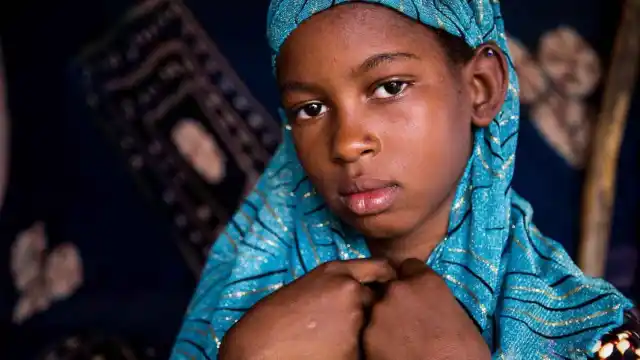
3. Meimouna (Mauritania)
Meimouna is 12 years old and engaged. She was a brilliant student, had good grades and dreamed of becoming a teacher. But in the refugee camp in Mberra (Mauritania) where she lives there is a danger: early marriage. And Meimouna was promised from a very young age to a member of her family.
“My mother told me one day that my father gave me my hand in marriage when I was still being breastfed. I understand what is happening, but I do not agree with it.”
Financial security is the main reason that Meimouna's family decided to marry her off. “At home, it's a normal thing. My two older sisters got married at 15 and 16, my mother at 10. We are a very poor family, my father died and my mother gets sick easily, so marriage is a security for the whole family.”
She is not just giving up her childhood. Child marriage puts her aspirations at risk: “I think the place for little girls is school, not a husband, at least until they are 18. I would like to learn – I am top of the class! I hope I can study long enough to fulfil my dream of becoming a teacher.”
In Mauritania, 37% of girls are married before the age of 18 and 18% before the age of 15. In this country, child marriage is directly linked to gender inequality and the belief that women and girls are somehow inferior to men and boys. Under national law, the minimum legal age for marriage is 18, without exception. Women cannot marry without the consent and presence of a guardian (wali) who must be male and Muslim. A woman's silence can be taken as consent.
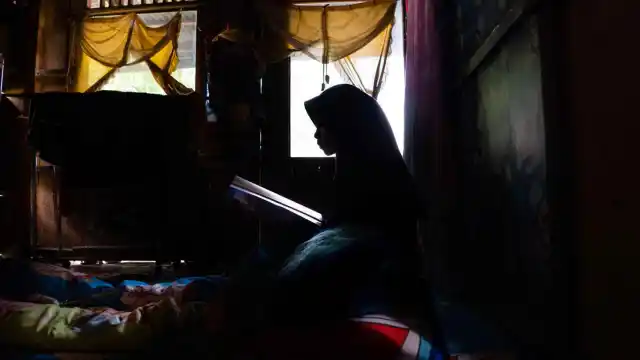
4. Mara (Indonesia)
Mara (not her real name) is a 15-year-old Indonesian girl. Last year her school closed and classes moved online due to the Covid-19 pandemic. Mara turned down a marriage proposal from a 23-year-old man so she could continue her studies.
Indonesia is the seventh country where girls are married before the age of 18. 16% of girls are married before the age of 18 and 2% are married before the age of 15. The main factors that cause child marriage to prevail, apart from poverty and religious conservatism, is the 'culture of shame' among the Bugis people that their daughters have unexpected pregnancies.
The minimum legal age for marriage for men and women, without parental consent, is 21. Since September 2019, boys and girls can marry, with parental consent, at the age of 19. It should be noted that parents can ask religious courts or local authorities for permission to marry their daughters earlier, without requiring any minimum age.

5. Rahaf (Lebanon)
Rahaf is a Syrian refugee living in a temporary shelter in Arsal, Lebanon. She was forced to marry at the age of 13. After leaving school, she became pregnant. Her husband abandoned her and took their child with him. Refugee girls in Lebanon are particularly vulnerable to child marriage.
Lebanon has no legal minimum age for marriage, nor does it have a civil code regulating marriages. Instead, religious courts have set a minimum age of 15 for marriage, based on 15 civil status laws. The minimum age for marriage therefore depends on registration in the civil registry to one of the 18 recognized religious groups.
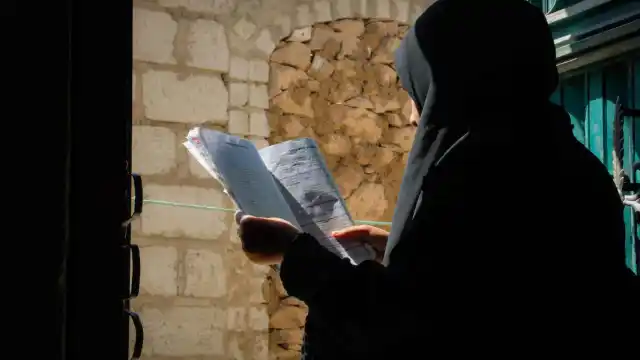
6. Asmaa (Yemen)
Asmaa was set to become another victim of child marriage. But fortunately her family was dissuaded from forcing her into marriage. Young Asmaa wishes that other parents could support their daughters' desire to finish their education and not force them into early marriage.
In Yemen, there are 4 million girls married before the age of 18. Within this group, 1.4 million were married before the age of 15. Marriage has become a protection and support mechanism for families. There is no legal minimum age for marriage.

 IHRO NEWS
IHRO NEWS